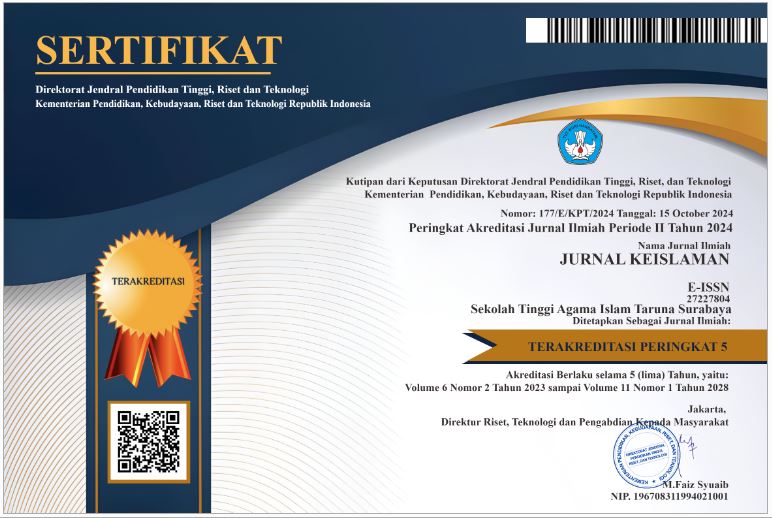Implementation Of Islamic Legal Principles In Islamic Education Management In The Digital Era
Implementasi Prinsip Hukum Islam dalam Manajemen Pendidikan Islam di Era Digital
DOI:
https://doi.org/10.54298/jk.v8i2.535Keywords:
Islamic education management, Digital era, Principles of Islamic law, Implementation of technologyAbstract
Islamic education management in the digital era faces various challenges in maintaining harmony between the use of technology and the principles of Islamic law, which must be maintained. Technology provides easy access to information and learning, but on the other hand, there is a potential risk of negative influences that can shift Islamic values if not managed wisely and in accordance with sharia. This study aims to analyze the implementation of Islamic legal principles in Islamic education management at SMPIT Al Muslih and to identify the challenges and solutions faced in integrating technology with Islamic values. The research method used was a qualitative approach with a case study. Data were collected through observation and in-depth interviews with administrators and educators at SMPIT Al Muslih. Data analysis was conducted using descriptive qualitative techniques. The results show that SMPIT Al Muslih has attempted to implement Islamic legal principles in educational management by paying careful attention to the use of technology. Technology is used to support the learning process and educational management, while maintaining compliance with sharia values. However, there are challenges related to inadequate regulations and low digital competence among educators. This hampers the optimal implementation of Islamic legal principles in educational management. The implications of this research indicate the need to develop policies and regulations that are adaptive to technological developments, while maintaining the integrity of Islamic values.
Downloads
References
Abdullahi Maidugu, U., & Adamu Tanko Isah. (2024). Islamic Education and its Value. Bulletin of Islamic Research, 2(4), 725–744. https://doi.org/10.69526/bir.v2i4.165
Ai Enung Nurhidayah. (2021). Efektivitas Model Pembelajaran Hybrid di Pendidikan Islam Pasca Pandemi dalam Tinjauan Manajemen dan Kesiapan Infrastruktur. Jurnal Ekonomi Dan Bisnis, 1(2), 6. https://doi.org/org/10.56145/jurnalekonomidanbisnis.v1i2.291
Dhawan, S. (2020). Online Learning: A Panacea in the Time of COVID-19 Crisis. Journal of Educational Technology Systems, 49(1), 5–22. https://doi.org/10.1177/0047239520934018
Elihami, E., Masuwd, M. A., Sheerly, S., Ismail, I., Sitonda, S., & Sudirman, M. Y. (2024). Data-Driven Approaches in Islamic Quality Management and Education Technology for Advancing Sustainable Development Goals. Jurnal Pendidikan Progresif, 14(3), 1599–1616. https://doi.org/10.23960/jpp.v14.i3.2024109
Jinan, M. R., Syapiuddin, M., & Nasri, U. (2024). Holistic Integration: Syariah Finance Principles in Islamic Education Management. Jurnal Ilmiah Profesi Pendidikan, 9(2), 1343–1350. https://doi.org/10.29303/jipp.v9i2.2243
Juhairiah, S., Kinasih, Q. Y., & Yuwono, D. T. (2024). Digital Transformation in Islamic Education : Opportunities , Challenges , and Its Impact on Islamic Values. Journal of Vocational Education and Educational Technology Innovations, 1(1), 1–6.
Kenneh, M. (2024). Sharia investment Challenges and Growth for Sustainable and Inclusive Financial Equality in Digital Innovation. Bulletin of Islamic Economics, 3(1), 1–11. https://doi.org/10.14421/bie.2024.031-01
Latifah, A. (2024). Transformasi Manajemen Pendidikan Islam Di Era Digital. An Najah (Jurnal Pendidikan Islam Dan Sosial Keagamaan), 3(2), 46–51. https://doi.org/org/10.21093/bjie.v4i2.9935
Lestari, D. I., & Kurnia, H. (2023). Implementasi Model Pembelajaran Inovatif untuk Meningkatkan Kompetensi Profesional Guru di Era Digital. JPG : Jurnal Pendidikan Guru, 4(3), 205–222. https://doi.org/10.32832/jpg.v4i3.14252
Lexy, M. J. (2021). Metode Penelitian Kualitatif. Remaja Rosdakarya.
Minarti, M., Norhidayati Rahmah, M., Khalilurrahman, K., Samsir, S., & Mardiana, M. (2023). Utilization of social media in Learning Islamic Religion: Its Impact on Strengthening Student Outcomes and Achievements. Nidhomul Haq : Jurnal Manajemen Pendidikan Islam, 8(2), 279–291. https://doi.org/10.31538/ndh.v8i2.3930
Setiawan, A. (2024). Edu Spectrum Ethical Decision-Making in Educational Leadership: Insights from Islamic Scholars ARTICLE INFO ABSTRACT. Edu Spectrum: Journal of Multidimensional Education, 1(1), 15–27. https://doi.org/org/10.70063/eduspectrum.v1i1.29
Shofiyyah, N. A., Komarudin, T. S., & Hasan, M. S. (2023). Innovations in Islamic Education Management within the University Context: Addressing Challenges and Exploring Future Prospects. Nidhomul Haq : Jurnal Manajemen Pendidikan Islam, 8(2), 193–209. https://doi.org/10.31538/ndh.v8i2.3625
Sholeh, M. I. (2023). Sinergi Hukum Keluarga Islam Dan Manajemen Pendidikan Dalam Membangun Generasi Keluarga Islam Berkualitas Dan Harmoni. Jurnal Kependidikan, 2(1), 71–85. https://doi.org/10.37348/jurisy.v3i2.262
Sugiyono. (2023). Metode Penelitian Pendidikan (Kuantitatif, Kualitatif, Kombinasi, R & D dan Penelitian Tindakan). Alfabeta.
Supriatna, A. (2023). Perkembangan Fikih dalam Era Digital: Kajian terhadap Metode Ijtihad dalam Memahami Masalah Kontemporer. As-Syar’i: Jurnal Bimbingan & Konseling Keluarga, 6(1), 717–734. https://doi.org/10.47467/as.v6i1.5478
Supriatna, A., Faisal, R., Nurhayanti, H., & Sarim, D. (2024). Penguatan Karakter Islami Siswa melalui Pembiasaan Shalat Dhuha di Madrasah Ibtidaiyah Tarbiyatul Athfal Pangkalan. Bulletin of Community Engagement, 4(3), 400–207. https://doi.org/10.51278/bce.v4i3.1572
Supriatna, D. (2025). Development of an Online-Based Islamic Education Management System in Islamic Primary Education Institutions. Journal of Asian Primary Education (JoAPE), 2(1), 14–27. https://doi.org/10.59966/joape.v2i1.1645
Syukri, M. D. A., & Rosyad, A. (2025). Integrating Modern Technology in Islamic Religious Education: Challenges and Opportunities for Teachers. The Journal of Academic Science, 2(4), 1148–1156. https://doi.org/org/10.59613/a05ebs36
Utami, A. T. (2024). Strategi Pengembangan Edukasi Hukum Syariah Kepada Masyarakat. J-CEKI : Jurnal Cendekia Ilmiah, 3(5), 2927–2935.
Uyuni, B., & Program, P. (2024). Philosophical Foundations in Training Traditional Religious Educators: Bridging Past and Present. Futurity Philosophy, 3(2), 40–65. https://doi.org/10.57125/fp.2024.06.30.03
Downloads
Published
Versions
- 2025-09-14 (2)
- 2025-09-14 (1)
How to Cite
Issue
Section
License
Copyright (c) 2025 Dhani Sudirman, Ricki Faisal, Hasan Al Banna, Rendi Atnanto, Mia Audina Musyadad

This work is licensed under a Creative Commons Attribution-ShareAlike 4.0 International License.
Authors who publish with this journal agree to the following terms:
- Authors retain copyright and grant the journal right of first publication with the work simultaneously licensed under a Creative Commons Attribution-ShareAlike 4.0 that allows others to share the work with an acknowledgement of the work's authorship and initial publication in this journal.
- Authors are able to enter into separate, additional contractual arrangements for the non-exclusive distribution of the journal's published version of the work (e.g., post it to an institutional repository or publish it in a book), with an acknowledgement of its initial publication in this journal.
- Authors are permitted and encouraged to post their work online (e.g., in institutional repositories or on their website) prior to and during the submission process, as it can lead to productive exchanges, as well as earlier and greater citation of published work (See The Effect of Open Access).


















